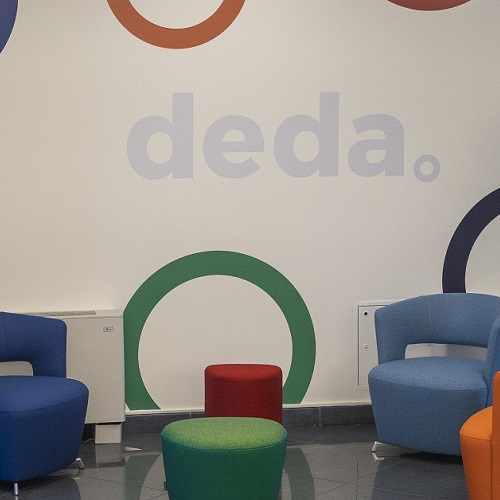

Being human in a work ecosystem increasingly dominated by innovation is not easy. The dawn of this fourth industrial revolution is changing market requirements apace. The development of technologies and the new services that these enable pose new challenges that require different skills to those used to date.
Research carried out by Gartner in the Human Resources field published this year describes a rapidly changing scenario. In the past four years, the number of skills required for the same professional profile has increased by 10% each year and, in the near future, more than half the workforce will need new skills to carry out their activities successfully. In fact, the same research points out that one in three skills listed in a job advert in the IT, financial or commercial field has already become obsolete in such a short period of time.
It is, therefore, clear that we are faced with a lack of “up-to-date skills” in the world of work that we could almost define as physiological, dictated by the speed of innovation: professionals are not always able to take full advantage of the opportunities that digitalization offers.
Therefore businesses have to deal with a dual need. First and foremost, they must update their people’s skills for the roles they cover. And, secondly, they must ensure that new skills are developed to meet current market needs.
The skill gap, which is often a digital skill gap, needs to be filled.
Some of the skills that require updating are of a technical nature, take time to be developed but follow a well-established and trusted learning pattern. On the other hand, there are others that relate more to the behavioral and relational sphere: the so-called soft skills, the teaching of which is far from straightforward. In fact, it is more challenging to train people on these aspects than on purely technological skills.
There is certainly an element of personal predisposition regarding soft skills but, in other respects, these can be learned and the only way to acquire them is through experience in the field.
Companies have become aware that they need soft skills far more than technical skills because these have become crucial for surviving in a labor market that today is, and will be even more tomorrow, the market of automation.
The latest report on the Future of Jobs prepared by the World Economic Forum argues that 85 million jobs could be replaced by machines by 2025. What seems like bad news, at first glance, is compensated by another figure in the same report.
By 2025 and with the advent of automation, 97 million jobs could emerge related to new skills, more suited to integration between machines, humans, and algorithms, which will have to be supported by soft skills.

In this rapidly changing context, we are working to build the Deda Group of the future. This is a complex task, which involves organizational and cultural aspects and is based strongly on how people act and interpret their own roles.
This year we launched the new Agile Working model in Italy, which has already been taken up by more than 90% of the company’s eligible workforce, and we are working to export the same scheme to our foreign offices as well, Mexico and the United States first of all. This is an important step in the process aimed at creating a Blended Workplace. In fact, the reorganization of work activities, alternating between home and office in a flexible manner, will be accompanied by the redesign of work spaces which, in the next few months, will be transformed into places for sharing and joint planning, fostering opportunities for interaction, discussion, and growth. Deda Group will thus become a workplace balanced between physical and virtual space, where it will be possible to create value through more fluid tools less bound to the concepts of space and time and where each person has first ownership of their own projects and results.
An organizational evolution that will also lead to a cultural change: in fact, the empowerment of each individual resource will encourage the development of a widespread sense of leadership, one of the main skills that, according to the World Economic Forum, will be required at work in 2025. It is precisely with a view to that future that we are working to ensure that all our people can build the skillset required to be the professionals of tomorrow. To this end, we have developed an extensive training program involving all our people.
Learning will become a key part of the growth strategy of companies. It is estimated that in the next few years almost half of professionals will require reskilling every six months, or even less . Training can, therefore, be nothing other than continuous and learning must be intentional and aware. One has to know how to turn every experience into a learning opportunity.

As early as 2017 — although we were less aware than today — we started to define the initiatives collectively referred to as (Y)Our Dedagroup Training and Culture. Our continuous training program for the development of a shared corporate culture includes, amongst the various proposals, an E-Academy and FIT Talks and Tech Talks, opportunities for an informal and interactive discussion with academics, professionals, or colleagues who make their own experience and skills available. This is because in Deda Group we believe that interaction and sharing are fundamental for continuous development. For this reason, we have designed a new initiative, Excellence, which aims to run right across the Group so that vision, values, and identity can be shared, and Deda Group’s future development can be designed with the contribution of all Deda People.
(Y)Our Dedagroup Training and Culture is a shared horizon, the “you” that becomes “we”. It is the path towards a collective business culture, marked by a style, an attitude to training that strives always for excellence, to knowing “what to do” and “how to be”. Only in this way can we generate the business value that is important for us and essential for the customer.
People are our main asset and Deda Group’s growth is closely related to our people’s growth and the enhancement of their skills.
With this aim in mind, for four years now we have been organizing (Y)Our Master, a real accelerator of personal and professional development. This is a training path designed by Deda People for Deda People, in which our talents can be trained in the critical thinking they must first interiorize and then bring to the market. This way our people can evolve, reinforcing their own transversal skills and the desire to work as a team, and exercising their ability to resolve internal problems and the ones relating to customers.
This is an approach that also involves the younger generations. In fact, since 2017 we have been developing the Dedagroup Digital Academy, a fully-fledged business school created to train the professionals of the future, providing them with the necessary tools to develop those skills that are now required by the labor market.
Our idea of human resource training can therefore be summed up in four key points:
”Knowing what to do” cannot disregard “knowing how to be”, in other words how we express our role within and outside the company. How we are all-round professionals. The differentiating element is the humanistic skill, the ability to combine technical skills with the way we approach the outside world and the company, so that every action is deeply bound to company values.